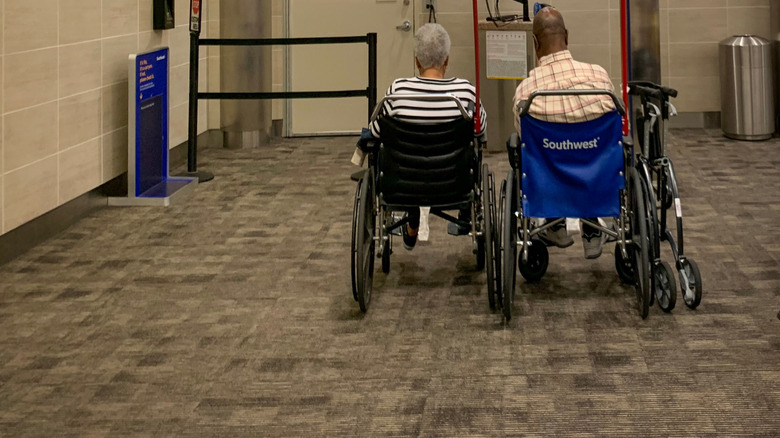What Disabled Travelers Need To Know About Southwest Airlines' New Lithium Battery Rule
Southwest Airlines' luggage policy change caused a huge stir in 2025 when the airline started charging for checked bags. And now, the company is rolling out another change, one that passengers with disabilities in particular should know about. Starting September 25, 2025, Southwest Airlines will require travelers who use powered mobility devices like wheelchairs and scooters to take out their removable lithium batteries before handing their devices over at baggage check. Passengers must now bring those batteries into the aircraft cabin with them. But don't worry — unlike when Southwest caught on and made it harder to pull off the sneaky carry-on pillow hack, the battery won't count as a carry-on or personal item.
The new rule is due to safety concerns — lithium batteries are a known fire risk. With the amount of lithium-related fire incidents seemingly on the rise, it's better to be safe than sorry. The airline will also impose a new capacity limit. Beginning January 11, 2026, only lithium batteries with 300 watt-hours or less will be accepted on planes. There will be a grace period until that date, so travelers whose batteries exceed that limit have time to adjust. "Lithium batteries have become one of the most common sources of smoke and fire incidents on aircraft," Southwest's vice president of safety and security Dave Hunt wrote in an email (via People). "While these events are rare, quick access and visibility are critical to keeping everyone onboard safe."
For travelers with mobility needs, some planning ahead will keep everything running smoothly from check-in to landing. First, make sure your device's battery is removable, and also check the battery capacity in advance. When in doubt, communicate with Southwest beforehand so there are no surprises at the gate.
Why is Southwest requiring passengers to remove lithium batteries from wheelchairs?
Devices powered with lithium batteries have long been some of the most common electronics to avoid packing in checked luggage, and an increase in fire incidents throughout 2025 has authorities on high alert. As of this writing, the Federal Aviation Administration (FAA) has tracked at least 55 lithium-related fire or smoke incidents on planes in 2025 alone, and that was only counting through August. On top of that, aviation workers filed more than 20 anonymous reports over concerns about lithium batteries in the first half of the year. With a lithium battery causing issues at least once a week, it's no wonder airlines like Southwest are under pressure to take extra precautions.
The issue with these kinds of batteries is thermal runaway, a reaction where lithium-ion cells overheat uncontrollably. The reaction occurs extremely fast, and batteries can get as hot as 752 degrees Fahrenheit before you know it. Once it starts, it's difficult to stop (hence the "runaway"), and this can lead to dangerously hot fires that are hard to put out.
"There's too little public awareness of the threat," Taylor Garland, spokesperson for the Association of Flight Attendants, told Forbes. She also said the fire-safety mechanisms already in place for checked baggage "are not designed to stop a lithium battery fire, so it's really better if all battery devices are in the cabin within arm's reach of their owner."

